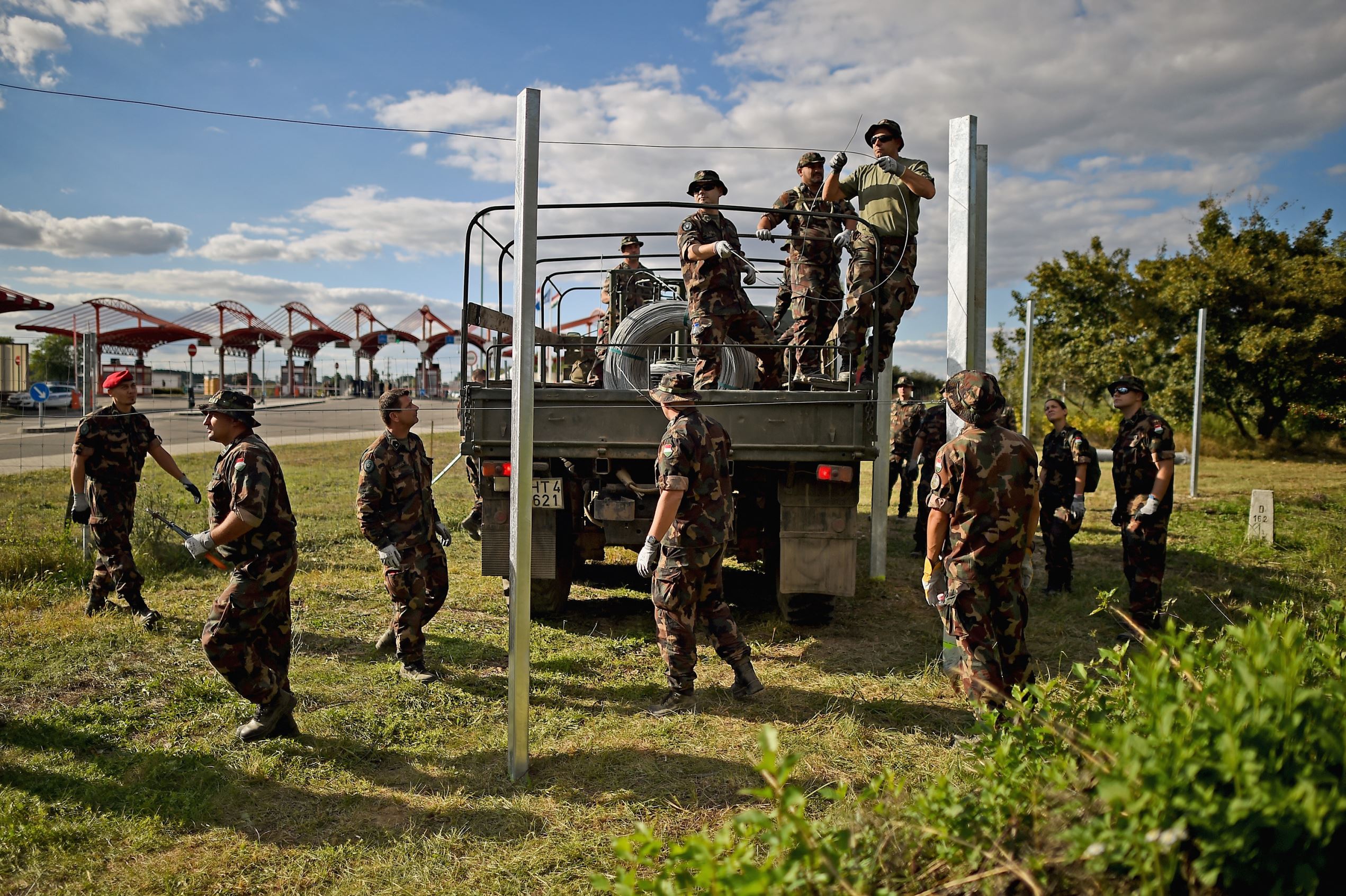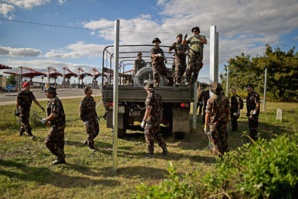The parliament of Hungary ordered the army to deploy an unit of arm forces to tackle the migrant influx at its border, whereby the army has not been permitted to use any lethal force. The law sanctioned the usage of rubber bullets, tear gas, net guns, and pyrotechnical devices, as per the parliamentary instructions.
The population of Hungary amounts to “10 million” and is surrounded by other countries. At present, the location of Hungary falls in the path of “the largest migration wave Europe has seen since World War Two”. From the beginning of this year till date, Hungary has registered “more than 220,000 asylum-seekers”. According to Prime- Minister, Viktor Orban, who addressed the parliament saying that police didn’t succeed in securing hundred percent Hungary’s borders, therefore the help from the army is very much required. He added, that with the army’s involvement:
"We can defend the Serbian stretch of the border”.
The Serbian frontier that meets Hungary has been fenced up and regular patrols are deployed in that region. This resulted in a “drastic drop of migrants” rushing into the country from that part of the world. Nevertheless, when one door closes, people flock around another. Likewise, many more migrants sought entry into Hungary, who were waved on from “Croatia and Zagreb”.
As Croatia is not a Schegen country, the “two countries” were at logger head about the migrant handling issue, while Budapest threatened that it will veto the “Schengen accession” of Croatia. Moreover, Hungary is already working to “fortify” its border security with Croatia. According to Orban:
"We can defend the Croatian stretch but to do that we need the army to patrol together with the police”.
The Prime Minister informed that Hungary will continue to take independent stance towards the migrant crisis issue till there a common guideline given by the EU. In Orban’s opinion:
"Europe is rich but weak. That is the most dangerous combination possible”.
"The result ... is catastrophic. Because Europe cannot defend its external borders, internal borders are shut again.
"We need to rethink many European inventions, institutions and treaties. But until we do we cannot sit idle. Until the EU states act as one, member states will be forced to go out of their way to fend off this brutal threat."
In fact, the government of Hungary published ads warnings in Arabic and English for alerting the migrants. The ads declared:
"Hungarians are hospitable, but the strongest possible action is taken against those who attempt to enter Hungary illegally”.
"The illegal crossing of the country's border is a crime punishable by imprisonment. Do not listen to the people-smugglers. Hungary will not allow illegal immigrants to cross its territory."
The said step initiated by the Prime Minister received support from the “nationalist Jobbik party”, whereby the law was passed after a win over “151 votes to 12 against and 27 abstentions in the 199-member parliament”. However, Helsinki Committee believes that the recent legal order is not a necessary measure. The co-chairman of Helsinki, Marta Padravi informed:
"Hungary is not at war with refugees. There is no armed conflict, neither at the Hungarian border nor in the country – but the army will have the powers to prevent the escalation of riots."
The population of Hungary amounts to “10 million” and is surrounded by other countries. At present, the location of Hungary falls in the path of “the largest migration wave Europe has seen since World War Two”. From the beginning of this year till date, Hungary has registered “more than 220,000 asylum-seekers”. According to Prime- Minister, Viktor Orban, who addressed the parliament saying that police didn’t succeed in securing hundred percent Hungary’s borders, therefore the help from the army is very much required. He added, that with the army’s involvement:
"We can defend the Serbian stretch of the border”.
The Serbian frontier that meets Hungary has been fenced up and regular patrols are deployed in that region. This resulted in a “drastic drop of migrants” rushing into the country from that part of the world. Nevertheless, when one door closes, people flock around another. Likewise, many more migrants sought entry into Hungary, who were waved on from “Croatia and Zagreb”.
As Croatia is not a Schegen country, the “two countries” were at logger head about the migrant handling issue, while Budapest threatened that it will veto the “Schengen accession” of Croatia. Moreover, Hungary is already working to “fortify” its border security with Croatia. According to Orban:
"We can defend the Croatian stretch but to do that we need the army to patrol together with the police”.
The Prime Minister informed that Hungary will continue to take independent stance towards the migrant crisis issue till there a common guideline given by the EU. In Orban’s opinion:
"Europe is rich but weak. That is the most dangerous combination possible”.
"The result ... is catastrophic. Because Europe cannot defend its external borders, internal borders are shut again.
"We need to rethink many European inventions, institutions and treaties. But until we do we cannot sit idle. Until the EU states act as one, member states will be forced to go out of their way to fend off this brutal threat."
In fact, the government of Hungary published ads warnings in Arabic and English for alerting the migrants. The ads declared:
"Hungarians are hospitable, but the strongest possible action is taken against those who attempt to enter Hungary illegally”.
"The illegal crossing of the country's border is a crime punishable by imprisonment. Do not listen to the people-smugglers. Hungary will not allow illegal immigrants to cross its territory."
The said step initiated by the Prime Minister received support from the “nationalist Jobbik party”, whereby the law was passed after a win over “151 votes to 12 against and 27 abstentions in the 199-member parliament”. However, Helsinki Committee believes that the recent legal order is not a necessary measure. The co-chairman of Helsinki, Marta Padravi informed:
"Hungary is not at war with refugees. There is no armed conflict, neither at the Hungarian border nor in the country – but the army will have the powers to prevent the escalation of riots."






